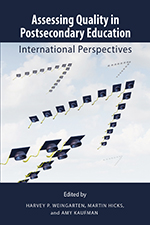
Why did those who created this agency include the word quality in its name, even though it resulted in one of the clumsiest acronyms — HEQCO — on the face of the earth?
I think it’s because they were smart and prescient. They understood that there are a million questions one could ask and research about a higher education system. But they also knew that the most important questions were inevitably about the quality of the education offered by the system and the quality of the learning experience for students. All the research we continue to do goes back to the primacy and foundation of the quality issue.
Followers of HEQCO know that we pursue three primary areas of research — equity of access, learning outcomes and system design. All three revolve around the issue of quality.
Our continuing work on equity of access emphasizes that this challenge is more than simply getting students in and out of the postsecondary door. It also leads us to ask the question, “Access to what?” And this means asking whether, once we get them in the door, does the education we offer students who are currently underrepresented in the system give them what they need to put them on equal footing with those who are well-represented and ensure they have the same chance at success?
Our long-standing commitment to learning outcomes and skills measurement is another quintessential quality issue. As I have argued previously, quality in higher education is answering the question of whether students and the public get from postsecondary studies what these programs advertise: Do students get the skills they thought they would get from participating in them and does the public get the benefits it was promised by investing in them?
Our deep analysis of the sustainability of the Ontario postsecondary system under the rubric of system design has repeatedly emphasized that sustainability is not primarily a financial matter, of whether revenues and expenses are in balance. Rather, it is fundamentally and critically about academic quality, whether institutions can or are providing quality programs with the resources available to them.
If I were a physicist, I would call the quality issue the unifying principle.
But how do we measure quality in the postsecondary world? We aren’t alone in struggling with this issue. This is why, as I wrote in a previous blog post, we invited experts from around the world for a two-day workshop in Toronto in May 2017 to discuss their approaches to measuring quality. I promised at that time that I would make public the results of these conversations and analyses. That day has arrived.
My colleagues and I recently published a book, Assessing Quality in Postsecondary Education: International Perspectives. You can get a copy here. Readers will learn about the approaches that various jurisdictions have taken to measuring quality, everything from measuring it indirectly by monitoring inputs and processes used to teach, to the use of surrogate markers such as graduation rates, to direct measurements of skills through the use of standardized tests. Readers will also see a provocative analysis calling for a reframing of the conversation from one of “quality” to one of “value.”
Finally, readers can see what we at HEQCO have learned from these various approaches and the way we are headed: toward direct, value-added measures of specific skills using psychometrically rigorous test instruments. This is what’s driving several of our ongoing and most ambitious projects.
If, like us, you are interested in the problem of measuring academic quality, you cannot help but be impressed, as we were, by the thoughtful, disciplined and varied approaches researchers from around the world are taking to this issue.
Enjoy. And thanks for reading.


One reply on “Harvey P. Weingarten — Why is the “Q” word in our name?”
Hello Mr Weingarten,
It was a pleasure to read your editorial on the ways and metrics available to measure the quintessential quality of higher education. More importantly you have highlighted a rethinking of the approach to measure Higher Education outcome and that is emphasizing value versus quality. I think though on the note of value vs quality, value is a more subjective quantifier, it has more elements of the personal experience added to it, and that is to measure the outcome of higher education from the perspective of the student, the 1st person beneficiary of this system design. Whereas quality on the other hand offers a more scholarly lens, an academic perspective to the issue of measuring higher education. I agree with you that value speaks more to the weight and importance of higher education than quality alone, in that sense because of the complexity of our world economy and the complexity of the work force that is getting more and more diverse and globalized by the day we can not see Higher Education as solely an avenue to gain higher credentials for the path to good-paying jobs but also as avenues of personal enrichment, development and growth.
As someone who has pondered (literally) outside of the post-secondary institutions door for years under the dilemma of what sort of higher education is it that I need? Is it one which could lead to an easy, high-pay job?Is it one which offer lots of career options down the road? or Is it the one which offers the more “value”. I think higher education, or the way it is being shaped now in Ontario is a good example on the world stage; it is like a prism, under which all sorts of people, from all walks of life and background, are able to find an avenue of receiving an education and possibly benefit from it.
Just some thoughts after reading your article, looking forward to more insightful analysis on quality higher education in Ontario and around the world.
Sincerely,
Kayley S.